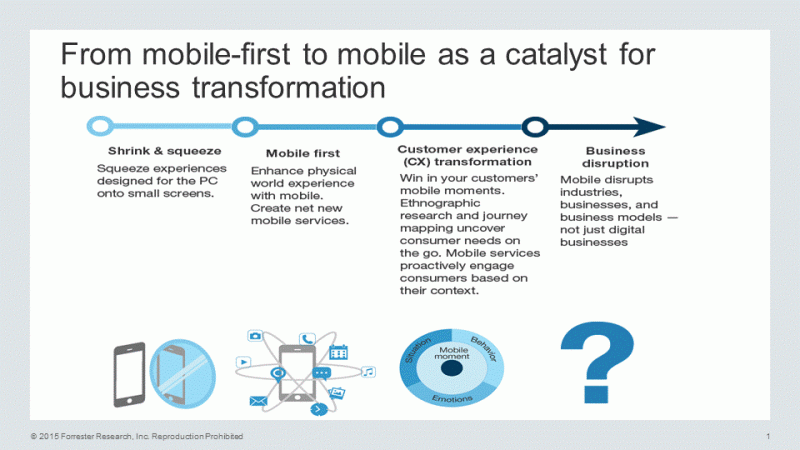Mobile-First Will Not Be Enough
The global mobile revolution is still in its early stages! Forrester forecasts that there will be nearly 3.5 billion individual smartphone users among more than 5 billion individual mobile subscribers by 2019. Mobile will clearly be the new battleground where you must win, serve, and retain your customers globally. Mobile is no longer simply a digital channel; it is an opportunity to transform customer experiences and to invent new businesses. It will be the hub of new connected experiences in mature economies but the ultimate “converged” medium in emerging ones.
To move away from simply shrinking and squeezing their desktop PC websites and ads onto mobile, many B2C marketers have embraced the notion of “mobile-first”. They are starting to design websites and marketing campaigns with mobile in mind instead of simply retrofitting their approach to mobile. More often than not, mobile-first still implies that you consider mobile as channel. While you must design with mobile in mind and adapt your content to smaller screens, this approach won’t be enough to fully address the upcoming global mobile revolution.
Marketers must now leverage mobile to transform their customer experience and to act as a catalyst for business disruption.

■ B2C Marketers must transform the overall experience to win in customers’ mobile moments . . .Marketers must stop thinking about mobile as a goal or a strategy and start thinking about how it can help them achieve their overall marketing and business objectives. Only 14% of the companies we surveyed have started down this path, and only 4% of them have allocated the resources, budget, and organization needed to undergo their own mobile mind shift. Those that are investing in the mobile mind shift are pulling ahead.
■ . . . and prepare for business disruption as mobile “eats the world.”[i]A few companies — mostly new pure plays like Airbnb, Uber, and WeChat — are using mobile to reinvent business models within existing industries. Marketing leaders should seize the opportunity to use mobile to transform their business. Why marketing leaders? Because they are, ultimately, responsible for understanding and meeting customer needs, inventing new products and services, and delivering differentiated customer experiences.
■ B2C Marketers should use mobile as a catalyst to mature their marketing programs. B2C marketing leaders should use mobile as a way to augment their marketing in all channels, to become more agile organizations, to localize their overall marketing approach, and to drive broader organizational transformation.
Clients who want to know more about this can download our latest report “The Global Mobile Revolution Is Just Beginning”
[i] To illustrate the disruptive power of mobile phones and how they had cannibalized several markets (such as cameras, video recorders, watches, and GPS standalone devices), Benedict Evans from Andreessen Horowitz said that “mobile is eating the world.” Source: Benedict Evans, “Presentation: mobile is eating the world,” Ben-evans.com, October 28, 2014 (http://ben-evans.com/benedictevans/2014/10/28/presentation-mobile-is-eating-the-world). Moving forward, Forrester believes mobile will disrupt not just product categories but entire industries, acting as a catalyst for business transformation.
